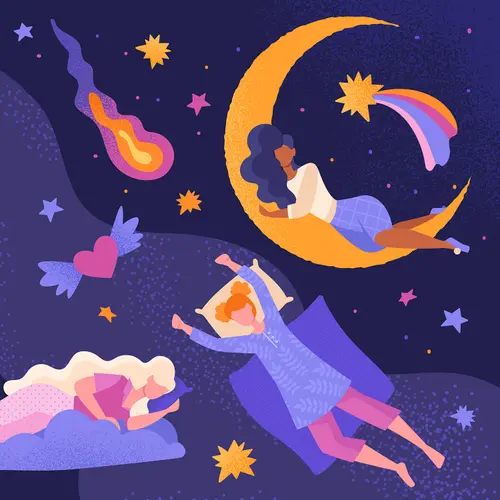Jeri Solomon is a morning person. Jim, her husband of 11 years, is not. Early in their relationship, it posed quite a problem. "When we were planning our wedding, I wanted to have these big discussions at 8 a.m., when I had been up for two hours and was fresh, but Jim would just be getting out of bed," says the 46-year-old floral designer from Melrose, Mass. "We ended up getting into a lot of arguments because I took his shrugs to be disinterest, when really he was just still half-asleep."
The couple learned to work around their differences over the years, but their situation is not uncommon, says Katherine Sharkey, MD, PhD, assistant professor of internal medicine and psychiatry and human behavior at Brown University and associate director of the Sleep for Science Research Lab. "More women tend to be larks, while men lean toward being night owls," she says.
What Causes Sleep Patterns
The question is: Why? The answer lies in each individual's biological internal clock -- or circadian rhythm, as scientists call it. "The human clock is about 24 hours, thanks to Earth's 24-hour light-dark cycle," Sharkey says. "But some people have a slightly longer natural cycle, and some are slightly shorter." If your circadian rhythm is on the long side, you're more likely to be a night owl. If it runs short, you're probably an early riser.
But your circadian rhythm can change over your lifetime. "There's a developmental piece to this puzzle -- school-age children are generally early birds, while teenagers tend to be night owls, and then as they age, adults gradually transition back into morning people," Sharkey says.
Besides the obvious problems with being a night owl if you have a day job, "night owls tend to be more depressed, have a higher dependence on caffeine, and use alcohol more," Sharkey says. But the news isn't all bad. A recent study in Belgium found that night owls are able to stay more focused as the day goes on, compared with early risers.
Morning people, however, also have advantages. "Larks generally sleep better, have more regular sleep patterns, and have more flexible personalities," Sharkey says. They also tend to be happier and feel healthier than night owls, according to a recent study from the University of Toronto.
Q&A on Teen Sleep
Q: "All her life my daughter has been a morning person. But since high school, she's a night owl, not going to bed until 1 or 2 a.m. each night. Is there a reason she's changed?"
Kim Olen, 45, marketing and public relations manager, Knoxville, Tenn.
A: "Ah, teenagers. Her late nights are partly biologically driven. Hormonal changes during puberty affect the body's internal clock, which means most high schoolers -- even ones who used to be early risers -- tend to stay up well after dark and sleep until noon. But fortunately, their clocks can be adjusted. Some tips to try: Have them stick to a schedule, and ban bright lights such as smartphones before bed."
Katherine Sharkey, MD, PhD assistant professor of medicine, Brown University, and associate director, Sleep for Science Research Lab
Find more articles, browse back issues, and read the current issue of "WebMD the Magazine."

